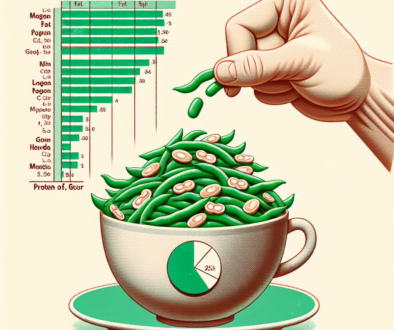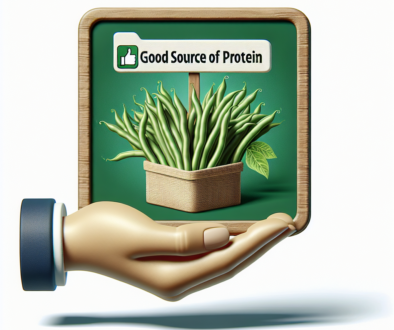The Future of Plant-based Diets: Mung Beans
-
Table of Contents
- Plant-Based Diets and Mung Beans: A Future Food Staple
- The Rise of Plant-Based Diets
- Understanding Mung Beans
- Health Benefits of Mung Beans
- Mung Beans in the Plant-Based Market
- Case Studies: Mung Bean Innovations
- Environmental Impact of Mung Beans
- Challenges and Opportunities
- Looking Ahead: The Future of Mung Beans
- Conclusion
- Discover ETprotein’s Mung Bean Protein Products
Plant-Based Diets and Mung Beans: A Future Food Staple

The global food landscape is undergoing a significant transformation as more individuals seek sustainable, healthy, and ethical eating options. Plant-based diets have surged in popularity, driven by concerns about health, the environment, and animal welfare. Among the myriad of plant-based foods, mung beans are emerging as a superfood with the potential to play a pivotal role in the future of sustainable nutrition. This article delves into the reasons behind the rise of plant-based diets, the unique benefits of mung beans, and how they could shape our dietary habits in the years to come.
The Rise of Plant-Based Diets
Plant-based diets are not a new phenomenon, but their adoption has accelerated in recent years. A combination of factors has contributed to this shift:
- Health Awareness: Research linking plant-based diets to lower risks of chronic diseases such as heart disease, diabetes, and certain cancers has encouraged people to adjust their eating habits.
- Environmental Concerns: The environmental impact of meat production, including greenhouse gas emissions and land use, has prompted a reevaluation of dietary choices.
- Animal Welfare: Ethical considerations regarding animal treatment in the food industry have led many to seek alternatives to animal products.
- Accessibility: The growing availability of plant-based products in supermarkets and restaurants has made it easier for consumers to adopt these diets.
As the demand for plant-based foods grows, the search for nutritious and versatile ingredients has brought mung beans into the spotlight.
Understanding Mung Beans
Mung beans, a staple in Asian cuisines, are small, green legumes packed with nutrients. They are an excellent source of protein, fiber, vitamins, and minerals, making them an ideal ingredient for plant-based diets. Mung beans are also known for their versatility; they can be consumed whole, sprouted, or processed into flour, noodles, and even dairy and meat substitutes.
Health Benefits of Mung Beans
The nutritional profile of mung beans is impressive, offering a range of health benefits:
- Protein-Rich: Mung beans are a great source of plant-based protein, essential for muscle repair and growth.
- Fiber Content: High in dietary fiber, mung beans can aid digestion and promote a feeling of fullness, which is beneficial for weight management.
- Antioxidant Properties: Rich in antioxidants, mung beans can help combat oxidative stress and reduce inflammation.
- Mineral-Rich: They provide essential minerals such as potassium, magnesium, and iron, which are crucial for various bodily functions.
These health benefits make mung beans an attractive option for those looking to improve their diet.
Mung Beans in the Plant-Based Market
The plant-based market has seen an influx of mung bean-based products. Companies are using mung beans to create meat substitutes, plant-based eggs, and dairy alternatives. These innovations are not only catering to vegetarians and vegans but also to flexitarians who occasionally consume meat and dairy.
Case Studies: Mung Bean Innovations
Several companies have successfully incorporated mung beans into their product lines:
- Meat Substitutes: Brands have developed mung bean-based burgers and sausages that mimic the taste and texture of meat.
- Plant-Based Eggs: Mung beans have been used to create a liquid egg substitute that scrambles like traditional eggs.
- Dairy Alternatives: Mung bean milk and cheese offer a lactose-free alternative to dairy products.
These products have been well-received by consumers, indicating a promising future for mung beans in the plant-based sector.
Environmental Impact of Mung Beans
One of the most compelling reasons for the rise of mung beans is their low environmental footprint. Compared to animal agriculture, mung beans require significantly less water and land to produce. They also fix nitrogen in the soil, reducing the need for synthetic fertilizers and improving soil health. This makes mung beans a sustainable crop that can contribute to a more eco-friendly food system.
Challenges and Opportunities
Despite the potential of mung beans, there are challenges to their widespread adoption:
- Consumer Awareness: Many consumers are unfamiliar with mung beans and their uses, which can hinder their acceptance.
- Scaling Production: As demand grows, scaling up mung bean production sustainably will be crucial.
- Research and Development: Continued innovation is needed to improve the taste and texture of mung bean-based products.
However, these challenges also present opportunities for growth and development within the plant-based industry.
Looking Ahead: The Future of Mung Beans
The future of mung beans in plant-based diets looks bright. As more consumers seek out sustainable and healthy food options, mung beans are well-positioned to become a staple ingredient. Continued innovation and marketing efforts can increase their popularity and make them a common choice for consumers around the world.
Conclusion
Plant-based diets are more than a trend; they represent a shift towards a more sustainable and health-conscious way of eating. Mung beans, with their nutritional benefits and low environmental impact, are poised to play a significant role in this dietary evolution. As the plant-based market continues to grow, mung beans offer a versatile and eco-friendly option that can cater to a wide range of tastes and preferences.
Discover ETprotein’s Mung Bean Protein Products
If you’re looking to incorporate high-quality mung bean protein into your diet or product line, ETprotein offers a range of options to meet your needs. Their mung bean protein is characterized by a neutral taste and is non-GMO and allergen-free, making it suitable for various applications. Whether you’re in the food and beverage industry or seeking nutritional supplements, ETprotein can provide the plant-based protein solutions you require.
About ETprotein:
ETprotein, a reputable protein Chinese factory manufacturer and supplier, is renowned for producing, stocking, exporting, and delivering the highest quality organic bulk vegan protein and plant proteins. They include Organic rice protein, clear rice protein, pea protein, clear pea protein, pumpkin seed protein, sunflower seed protein, mung bean protein, etc. Their offerings, characterized by a neutral taste, non-GMO, allergen-free attributes, cater to a diverse range of industries. They serve nutraceutical, pharmaceutical, cosmeceutical, veterinary, as well as food and beverage finished product distributors, traders, and manufacturers across Europe, USA, Canada, Australia, Thailand, Japan, Korea, Brazil, and Chile, among others.
ETprotein specialization includes exporting and delivering tailor-made protein powder and finished nutritional supplements. Their extensive product range covers sectors like Food and Beverage, Sports Nutrition, Weight Management, Dietary Supplements, Health and Wellness Products, and Infant Formula, ensuring comprehensive solutions to meet all your protein needs.
As a trusted company by leading global food and beverage brands and Fortune 500 companies, ETprotein reinforces China’s reputation in the global arena. For more information or to sample their products, please contact them and email sales(at)ETprotein.com today.












